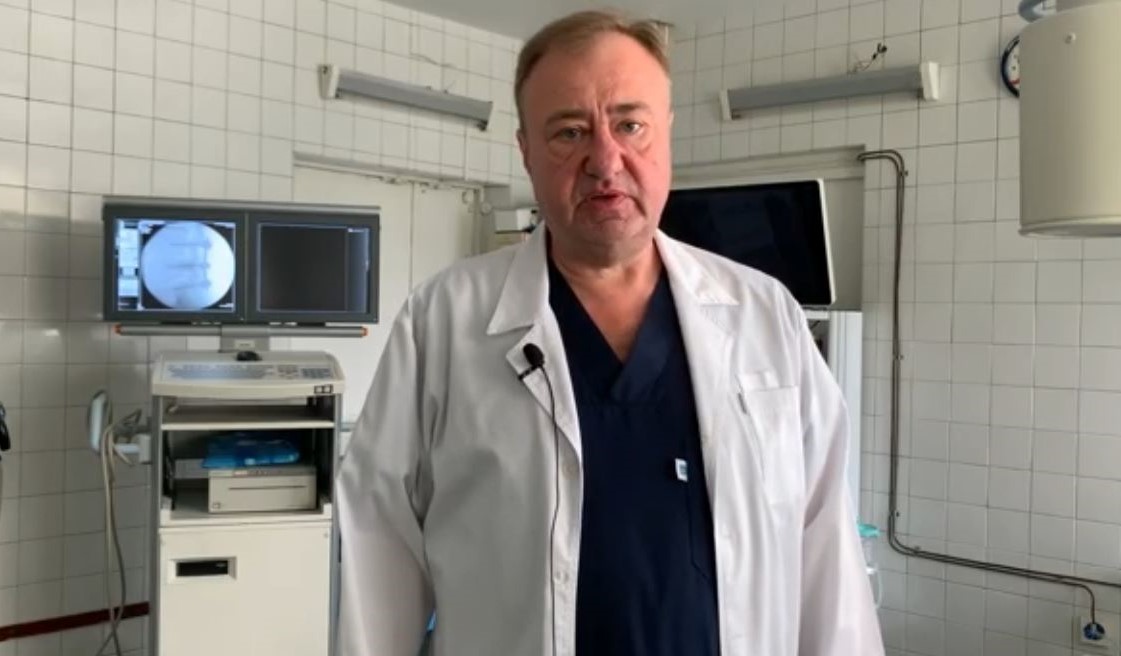Calls for Ukraine
Calls for Europe
Calls for USA

MedTour company continues to be interested in innovations taking place in the field of Ukrainian medicine. This time we talked to a neurosurgeon at the Romadanov Institute of Neurosurgery.
Introduce yourself.
My name is Alexander Tanaseychuk, neurosurgeon of the Department of Endoscopic and Laser Spinal Neurosurgery of the Academician Romodanov Institute of Neurosurgery. This is a state institute, which is the main center of neurosurgery in Ukraine.
Tell us what your department does?
Our branch was established 27 years ago in 1995. Since its opening, we have been engaged in laser, microsurgical, endoscopic surgery for spinal pathology.
What diseases do you treat?
Almost any diseases of the spine are treated in our department, but we pay the most attention to the treatment of osteochondrosis, herniated discs, spinal instability, various types of back injuries, and spinal tumors.
Tell us more about the place where we are now?
We are in the operating room of the Department of Laser and Endoscopic Spinal Neurosurgery. Taking this opportunity, I can present you the equipment that the operating room is equipped with. You see a modern operating microscope, which is switched on in the mode of demonstrating the previous surgical intervention. It was an operation to remove an intervertebral hernia using a posterior endoscopic approach. The adjacent device is an image intensifier tube, which has now captured a control image of the installation of a transpedicular stabilization system in a patient with spinal instability.
What technological capabilities does your department have?
We have rather large technological capabilities, because recently, thanks to the active assistance of the government and the leadership of the institute, we have received all the most necessary, the most modern equipment, including new endoscopic units, surgical microscopes, and much more.
What is missing in your department?
In the American, European, South Korean system of medicine, there has really been a breakthrough in the field of neurosurgery. Nevertheless, the only thing that we do not have from the entire spectrum that our colleagues abroad have is remote surgical robots and nanotechnologies. Otherwise, we have everything the same as they have.
Tell us more about neurooncological diseases.
Neurooncological diseases in neurosurgery are quite common. However, this is somewhat less common in spinal neurosurgery, as the ratio of brain tumors to spinal cord tumors is approximately 1 in 1,000 cases. Nevertheless, we have all the resources and the necessary modern equipment for the surgical treatment of any oncological diseases of the spinal cord.
How are operations to remove a herniated disc performed in your department?
A neurosurgical operation to remove a herniated disc takes approximately 20 minutes. It is performed under intravenous anesthesia. This is a completely minimally invasive intervention, in which no injury to the spine is applied. Over the past 25 years, we have performed approximately 1,000 of these operations per year. In other words, we have already operated on about 25,000 patients. It is also worth noting that during all this time there was not a single lethal outcome during the operation, as well as there were no serious complications in the form of damage to the nerve function. That is, to put it bluntly, none of the patients got worse after the operation.
What types of neurosurgery do you perform?
We perform all types of operations: open, closed, endoscopic, microsurgical, puncture and others. That is, we have access to the entire range of neurosurgical interventions that are currently being performed.
What is the cost of a neurosurgical operation?
The cost of the operation, which is carried out in Ukraine, is incommensurable with the price of similar surgical interventions in Europe and America. There, in some cases, the cost can be hundreds of times higher. In our institute, the patient spends money only on the purchase of consumables necessary for the operation. It is also worth noting that insurance medicine in Europe and America assumes a queue for patients. We have small queues, and the patient can receive the necessary assistance as soon as possible after the appeal.
What else does your department do?
We don’t just do operations. Our department also performs a wide range of advisory tasks. Only 20% of patients require surgical treatment. And we examine 80% of patients and give recommendations. We have developed our own recommendations for the treatment of patients with spinal osteochondrosis and herniated discs. Thus, we perform not only surgical work, but also consultative, diagnostic, and preventive work. This allows us to treat patients not only surgically, but also conservatively (using pills, injections, blockades, etc.).
Doctor Tanaseychuk’s consultation can be obtained online. If the patient needs surgery, MedTour’s coordinating doctors will help organize all stages of treatment from the initial consultation to hospitalization.
Please rate the work of MedTour
